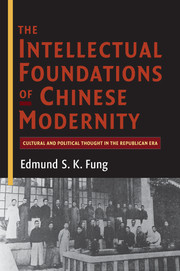 The Intellectual Foundations of Chinese Modernity
The Intellectual Foundations of Chinese Modernity Book contents
- Frontmatter
- Contents
- Acknowledgements
- Abbreviations
- A Note on Romanization
- Introduction
- 1 The Push of Westernized Radicalism
- 2 The Pull of Cultural Conservatism
- 3 The Politics of Modern Chinese Conservatism
- 4 Liberalism in China and Chinese Liberal Thought
- 5 The State, Government and the Rule of Law
- 6 The Rise of Reformist Socialist Thought
- 7 From State Socialism to Social Democracy
- Conclusion
- Glossary
- Selected Bibliography
- Index
- References
1 - The Push of Westernized Radicalism
Published online by Cambridge University Press: 03 May 2010
- Frontmatter
- Contents
- Acknowledgements
- Abbreviations
- A Note on Romanization
- Introduction
- 1 The Push of Westernized Radicalism
- 2 The Pull of Cultural Conservatism
- 3 The Politics of Modern Chinese Conservatism
- 4 Liberalism in China and Chinese Liberal Thought
- 5 The State, Government and the Rule of Law
- 6 The Rise of Reformist Socialist Thought
- 7 From State Socialism to Social Democracy
- Conclusion
- Glossary
- Selected Bibliography
- Index
- References
Summary
The question of modernity in post-imperial China dates back to the New Culture/May Fourth Movement (1915–23), which is often symbolically interpreted as the Chinese Enlightenment. Just as the European Enlightenment was a diverse and complex movement that developed in different ways in France, England, Scotland and elsewhere with thinkers as diverse as Jean-Jacques Rousseau, Voltaire (François-Marie Arouet), John Locke and David Hume, so New Culture/May Fourth was a multilayered movement that makes an excellent study in contrast. Its strongest feature, as Hao Chang has pointed out, was the binary and dialectical nature (liangqixing) of its thought – rationalism and romanticism, scepticism and ‘new religion’, individualism and collectivist consciousness, nationalism and cosmopolitanism. There were a variety of ideologies – liberalism, democracy, anarchism, socialism, utopianism and humanism, among others – representing competing ideas that interplayed and reacted with one another. As Rana Mitter has written, ‘the May Fourth period marked…a sense of real and impending crisis; a combination of a plurality of competing ideas aimed at “saving the nation”, and an audience ready to receive, welcome, contest, and adapt these ideas’. Two of those ideas were cultural radicalism and cultural conservatism, one representing the modernity of Enlightenment and the other representing counter-Enlightenment.
At the outset, the discourse on modernity concerned the future of Chinese culture in the post-imperial era. To be modern, China needed to Westernize. A number of questions were raised by Republican intellectuals: Where was China going as it met the world without the monarchy? What did Westernization entail?
- Type
- Chapter
- Information
- The Intellectual Foundations of Chinese ModernityCultural and Political Thought in the Republican Era, pp. 27 - 60Publisher: Cambridge University PressPrint publication year: 2010


